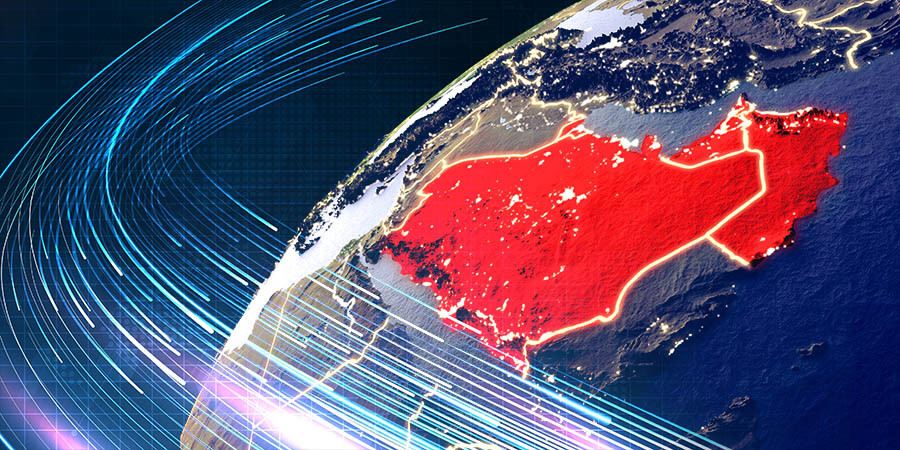Currently, several Middle Eastern countries, including the UAE, Bahrain, Jordan, and Qatar, have emerged as frontrunners in the deployment and adoption of fiber optic technology. These nations have seen their rankings in the Ookla Speedtest Global Index for fixed broadband soar, thanks to the introduction of gigabit packages and the enhancement of entry-level speeds.
Read More: Enhancing Gulf Fiber Speeds: How ISPs Support Router Configurations and Upgrades
Read More: FTTR: Taking Fixed Broadband to the Next Level
This remarkable progress in fiber coverage is largely attributed to local ISPs' efforts to expand their networks, promote higher-speed plans, and make these services more affordable. Crucially, government support has played a pivotal role in accelerating fiber roll-outs, ensuring these countries meet the growing demand for data services and achieve universal access to high-speed internet as part of their national broadband development strategies.
Performance of GCC Countries
According to Ookla’s Speedtest Intelligence metrics, the UAE led the Middle East in fixed broadband performance in Q1 2024, achieving a median download speed of 270.91 Mbps and an upload speed of 124.37 Mbps.
The UAE saw the largest speed improvement among the reviewed countries, with a significant turning point occurring in Q4 2022. During this period, ISPs increased the minimum broadband package speed from 250 Mbps to 500 Mbps and offered substantial discounts to promote upgrades to faster fiber packages.
Related: UAE Ranks 1st on Mobile, Top 20 in Fixed Broadband Speeds Globally
Telecom Review In-Depth Analysis: The State of UAE’s Mobile and Fixed Networks in Q1 2023
Moreover, Bahrain and Qatar both witnessed substantial and swift increases in median download speeds, reaching 83.09 Mbps and 135.34 Mbps, respectively. Additionally, ISPs in these nations observed notable enhancements in upload speeds.
Qatar, in particular, experienced a remarkable surge in median upload speed, tripling from Q1 2022 to Q1 2024, reaching 115.74 Mbps. Meanwhile, in Bahrain, the median upload speed surged by over 2.7 times.
In April 2023, Bahrain's telecoms regulator mandated ISPs to double the speed of entry-level fiber packages while maintaining the same wholesale prices. This directive had an immediate impact on the market, with median broadband download speeds skyrocketing from 48.14 Mbps in Q1 2023 to 70.17 Mbps in Q2 2023 (a surge of over 40%).
Related: Bahrain Leads Among GCC Countries in Offering Affordable Fiber Broadband Services
Qatar was the GCC's pioneer in providing 10 Gbps consumer broadband packages. Initially, Ooredoo and Vodafone maintained a modest 100 Mbps download speed for entry-level tariffs. However, in June 2023, they elevated the minimum speed to 1 Gbps and offered discounts on fiber packages. These moves led to a significant jump in download speeds, surging by 41% in Q1 2024 compared to Q2 2023.
Related: Qatar’s Gigabit-Speed Fibre Penetration Highest in the World, Report Says
Jordan's rapid uptake of fiber significantly increased the country's median speeds for both download and upload, reaching 130.41 Mbps and 108.08 Mbps, respectively, in Q1 2024. Notably, Jordan doubled its median upload speed in just two years, narrowing the gap with its median download speed.
Compared to the other markets, Saudi Arabia experienced a more modest increase in speed, resulting in a drop of 11 places in the global ranking to 46th in March 2024. However, despite this, the share of fiber in stc’s Speedtest samples has been growing steadily, representing 75.4% in March 2024, up from 69.9% in Q4 2023. This increased adoption of fiber contributed to an overall improvement in fixed broadband performance across various metrics and widened the performance gap with legacy DSL lines.
On another note, in November 2023, Opensignal highlighted Salam's outstanding performance across key metrics, solidifying its leadership in the Saudi Arabian fixed broadband market.
Affordability Barrier
While factors such as geography, competition levels, and government policies continue to influence fiber deployment in the Middle East, affordability has emerged as a crucial barrier to widespread gigabit adoption.
Despite displaying gigabit internet-ready infrastructure in certain Middle Eastern countries, the significant income disparity and high costs of these packages impede the uptake of high-speed broadband services.
While a 1 Gbps fiber line in locations such as Hong Kong or Singapore are offered for as low as USD 30 per month, comparable monthly plans tend to be more expensive in the GCC, ranging from USD 100 in Qatar, to USD 150 in the UAE, to USD 250 in Saudi Arabia, and USD 345 in Bahrain.
Closing this affordability gap is essential to encourage the acceleration of high-speed broadband adoption across the region.
Telecom Review Exclusive Report: ITU Report: Steady But Uneven Progress in Global Internet Connectivity
Latest Coverage: Driving Change: WTISD 2024 Inspires Collaboration for Sustainable Digital Innovation











